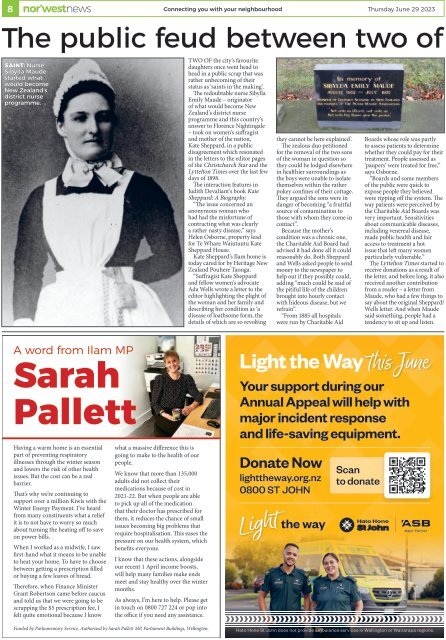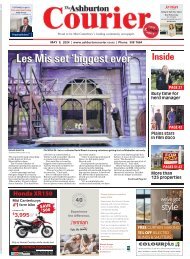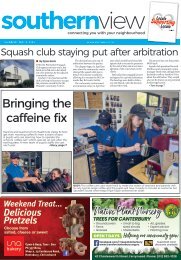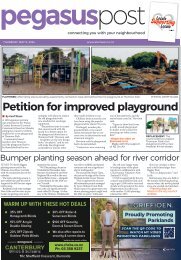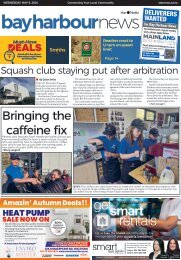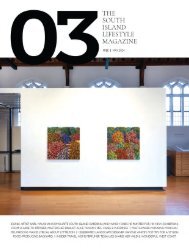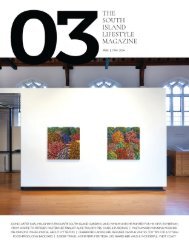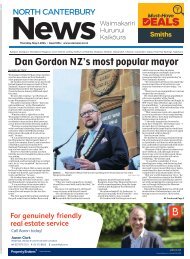You also want an ePaper? Increase the reach of your titles
YUMPU automatically turns print PDFs into web optimized ePapers that Google loves.
8<br />
Thursday <strong>June</strong> <strong>29</strong> <strong>2023</strong><br />
The public feud between two of<br />
SAINT: Nurse<br />
Sibylla Maude<br />
started what<br />
would become<br />
New Zealand’s<br />
district nurse<br />
programme.<br />
TWO OF the city’s favourite<br />
daughters once went head to<br />
head in a public scrap that was<br />
rather unbecoming of their<br />
status as ‘saints in the making’.<br />
The redoubtable nurse Sibylla<br />
Emily Maude – originator<br />
of what would become New<br />
Zealand’s district nurse<br />
programme and this country’s<br />
answer to Florence Nightingale<br />
– took on women’s suffragist<br />
and mother of the nation,<br />
Kate Sheppard, in a public<br />
disagreement which resonated<br />
in the letters to the editor pages<br />
of the Christchurch Star and the<br />
Lyttelton Times over the last few<br />
days of 1898.<br />
The interaction features in<br />
Judith Devaliant’s book Kate<br />
Sheppard: A Biography.<br />
“The issue concerned an<br />
anonymous woman who<br />
had had the misfortune of<br />
contracting what was clearly<br />
a rather nasty disease,” says<br />
Helen Osborne, property lead<br />
for Te Whare Waiutuutu Kate<br />
Sheppard House.<br />
Kate Sheppard’s Ilam home is<br />
today cared for by Heritage New<br />
Zealand Pouhere Taonga.<br />
“Suffragist Kate Sheppard<br />
and fellow women’s advocate<br />
Ada Wells wrote a letter to the<br />
editor highlighting the plight of<br />
the woman and her family and<br />
describing her condition as ‘a<br />
disease of loathsome form, the<br />
details of which are so revolting<br />
they cannot be here explained’.<br />
The zealous duo petitioned<br />
for the removal of the two sons<br />
of the woman in question so<br />
they could be lodged elsewhere<br />
in healthier surroundings as<br />
the boys were unable to isolate<br />
themselves within the rather<br />
pokey confines of their cottage.<br />
They argued the sons were in<br />
danger of becoming “a fruitful<br />
source of contamination to<br />
those with whom they come in<br />
contact”.<br />
Because the mother’s<br />
condition was a chronic one,<br />
the Charitable Aid Board had<br />
advised it had done all it could<br />
reasonably do. Both Sheppard<br />
and Wells asked people to send<br />
money to the newspaper to<br />
help out if they possibly could,<br />
adding “much could be said of<br />
the pitiful life of the children<br />
brought into hourly contact<br />
with hideous disease, but we<br />
refrain”.<br />
“From 1885 all hospitals<br />
were run by Charitable Aid<br />
Boards whose role was partly<br />
to assess patients to determine<br />
whether they could pay for their<br />
treatment. People assessed as<br />
‘paupers’ were treated for free,”<br />
says Osborne.<br />
“Boards and some members<br />
of the public were quick to<br />
expose people they believed<br />
were ripping off the system. The<br />
way patients were perceived by<br />
the Charitable Aid Boards was<br />
very important. Sensitivities<br />
about communicable diseases,<br />
including venereal disease,<br />
made public health and fair<br />
access to treatment a hot<br />
issue that left many women<br />
particularly vulnerable.”<br />
The Lyttelton Times started to<br />
receive donations as a result of<br />
the letter, and before long, it also<br />
received another contribution<br />
from a reader – a letter from<br />
Maude, who had a few things to<br />
say about the original Sheppard/<br />
Wells letter. And when Maude<br />
said something, people had a<br />
tendency to sit up and listen.<br />
A word from Ilam MP<br />
Sarah<br />
Pallett<br />
Having a warm home is an essential<br />
part of preventing respiratory<br />
illnesses through the winter season<br />
and lowers the risk of other health<br />
issues. But the cost can be a real<br />
barrier.<br />
That’s why we’re continuing to<br />
support over a million Kiwis with the<br />
Winter Energy Payment. I’ve heard<br />
from many constituents what a relief<br />
it is to not have to worry so much<br />
about turning the heating off to save<br />
on power bills.<br />
When I worked as a midwife, I saw<br />
first-hand what it means to be unable<br />
to heat your home. To have to choose<br />
between getting a prescription filled<br />
or buying a few loaves of bread.<br />
Therefore, when Finance Minister<br />
Grant Robertson came before caucus<br />
and told us that we were going to be<br />
scrapping the $5 prescription fee, I<br />
felt quite emotional because I know<br />
what a massive difference this is<br />
going to make to the health of our<br />
people.<br />
We know that more than 135,000<br />
adults did not collect their<br />
medications because of cost in<br />
2021-22. But when people are able<br />
to pick up all of the medication<br />
that their doctor has prescribed for<br />
them, it reduces the chance of small<br />
issues becoming big problems that<br />
require hospitalisation. This eases the<br />
pressure on our health system, which<br />
benefits everyone.<br />
I know that these actions, alongside<br />
our recent 1 April income boosts,<br />
will help many families make ends<br />
meet and stay healthy over the winter<br />
months.<br />
As always, I’m here to help. Please get<br />
in touch on 0800 727 224 or pop into<br />
the office if you need any assistance.<br />
Funded by Parliamentary Service. Authorised by Sarah Pallett MP, Parliament Buildings, Wellington.


